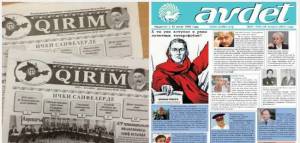Crimean Tatar newspapers again suspected of ‘extremism”

In yet another unpleasant echo of Soviet times, two Crimean Tatar newspapers – ‘Avdet’ and ‘Kyyrym’ - have been ‘denounced’ for allegedly ‘circulating extremist material’. Chief Editor of Avdet, Shevket Kaibullaev reports that he received a summons to the FSB [Russian Security Service] on July 24 over a supposed complaint by a member of the public to Roskomnadzor, the body responsible for ‘supervising’ – and restricting – the media and information technology.
Kaibullaev believes that the ‘complaint’ against the two newspapers is in fact a denunciation. The letter claims that the papers are publishing calls to extremist activity. It cites material from Avdet regarding the decision by the Mejlis or representative body of the Crimean Tatar People to boycott the coming elections to the Crimean parliament. This was viewed as ‘extremist’ and Kaibullaev was asked to give his explanation. No warning was issued.
Avdet’s chief editor is adamant that the editorial policy of the newspaper, which is the Mejlis’s newspaper, will remain unchanged.
This is not the first time since Russia occupied the Crimea in late February 2014 that accusations of ‘extremism’ have been directed at Kaibullaev and his newspaper. As reported, he received a formal warning in June over supposed ‘propaganda of extremism’. Kaibullaev had been summoned to the prosecutor’s office on June 3 regarding what the person installed since the occupation as chief prosecutor, Natalya Poklonskaya claimed to be “a violation of the law of the Russian Federation on countering extremist activities” by the editorial board. The prosecutor’s office considered that texts in the newspaper arouse tension in inter-ethnic relations and constitute extremist activity.
The words deemed ‘extremist’ appeared to include ’annexation’, ‘occupation’ and ‘temporary occupation of the Crimea’.
On July 5, the head of the Mejlis, Refat Chubarov was stopped from returning to the Crimea after attending a meeting of the Mejlis held exceptionally in mainland Ukraine to enable Mustafa Dzhemiliev to attend. The veteran Crimean Tatar leader and Chubarov’s predecessor in the Mejlis has been under a ban since late April this year.
Poklonskaya on that occasion read Chubarov a prosecutor’s warning claiming that his activities fell under the same Russian Law on Extremism. Chubarov was shortly afterwards handed a scrappy document prohibiting him entering the Russian Federation for five years.
There has been frustratingly little protest from western countries at such overt violations of the rights of Dzhemiliev and Chubarov, and over mounting pressure and repressive measures against Crimean Tatars in their homeland.
Halya Coynash





